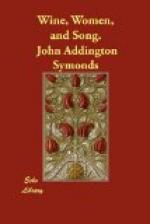“Come therefore now,
my gentle fere,
Whom as my heart I hold full
dear;
Enter my little room, which
is
Adorned with quaintest rarities:
There are the seats with cushions
spread,
The roof with curtains overhead;
The house with flowers of
sweetest scent
And scattered herbs is redolent:
A table there is deftly dight
With meats and drinks of rare
delight;
There too the wine flows,
sparkling, free;
And all, my love, to pleasure
thee.
There sound enchanting symphonies;
The clear high notes of flutes
arise;
A singing girl and artful
boy
Are chanting for thee strains
of joy;
He touches with his quill
the wire,
She tunes her note unto the
lyre:
The servants carry to and
fro
Dishes and cups of ruddy glow;
But these delights, I will
confess,
Than pleasant converse charm
me less;
Nor is the feast so sweet
to me
As dear familiarity.
“Then come now, sister
of my heart,
That dearer than all others
art,
Unto mine eyes thou shining
sun,
Soul of my soul, thou only
one!
I dwelt alone in the wild
woods,
And loved all secret solitudes;
Oft would I fly from tumults
far,
And shunned where crowds of
people are.
O dearest, do not longer stay!
Seek we to live and love to-day!
I cannot live without thee,
sweet!
Time bids us now our love
complete.
Why should we then defer,
my own,
What must be done or late
or soon?
Do quickly what thou canst
not shun!
I have no hesitation.”
From Du Meril’s collections further specimens of thoroughly secular poetry might be culled. Such is the panegyric of the nightingale, which contains the following impassioned lines:[4]—
“Implet silvas atque
cuncta modulis arbustula,
Gloriosa valde facta veris
prae laetitia;
Volitando scandit alta arborum
cacumina,
Ac festiva satis gliscit sibilare
carmina.”
Such are the sapphics on the spring, which, though they date from the seventh century, have a truly modern sentiment of Nature. Such, too, is the medieval legend of the Snow-Child, treated comically in burlesque Latin verse, and meant to be sung to a German tune of love—
Modus Liebinc. To the same category may be referred the horrible, but singularly striking, series of Latin poems edited from a MS. at Berne, which set forth the miseries of monastic life with realistic passion bordering upon delirium, under titles like the following—Dissuasio Concubitus in in Uno tantum Sexu, or De Monachi Cruciata.[5]
FOOTNOTES:
[Footnote 1: Du Meril, Poesies Populaires Latines Anterieures au Deuxieme: Siecle, p. 240.]
[Footnote 2: Du Meril, op. cit., p. 239.]




